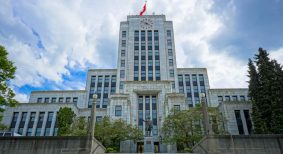A new report from the Canadian Urban Institute (CUI) confirms that how Canadians experienced the impacts of COVID-19 throughout the past year depended very much on where they live, whether or not they have children, and whether they are racialized or white.
COVID Signpost 365 provides a seminal report on the year since the World Health Organization declared a global pandemic, and illustrates that Canada’s 20 largest cities, home to 42 per cent of the population, were hit disproportionately experiencing 62 per cent of COVID cases and 64 per cent of deaths.
Drawn from public health data, community leaders and opinion research involving 180,000 Canadians over the past year, COVID Signpost 365 found the impact of the virus has profoundly shaped people’s attitudes and concerns about virtually every aspect of their lives, with racialized and lower income residents reporting far greater impacts virtually across the board.
From personal finances, work and socialization, to travel, public transportation and the way we care for children and elderly family members, COVID-19 affected not only the way we live, but our perceptions and thoughts about the future.
Exploring aspects of COVID-19 that changed how we live, work, move, care and thrive, COVID Signpost 365 also reveals profound differences in how these changes were experienced depending on gender, age, people living with or without children and among racialized and lower income residents of Canada.
The report also compiles more than 100 examples of community leadership that emerged across the country, and reveals how Canada’s largest cities banded together to tackle their most pressing problems.
“Over the past year, COVID has wreaked havoc on our world. We have lost more than 22,000 Canadians, with more than 893,000 people sick with confirmed cases of the virus. For the lucky among us who did not contract COVID, the impacts have still been severe,” says Mary W. Rowe, president and CEO, Canadian Urban Institute. “For racialized communities, people living in poverty and others who already faced significant barriers in their lives, the COVID
experience has been even more difficult. This report tells the story of the past year by sharing the thoughts and opinions of thousands of Canadians, and the inspiration provided through remarkable examples of local leadership. It closes a chapter on a year unlike any other and tells us just how much work we have to do to build back cities that are more just, equitable, livable and vibrant for everyone.”









